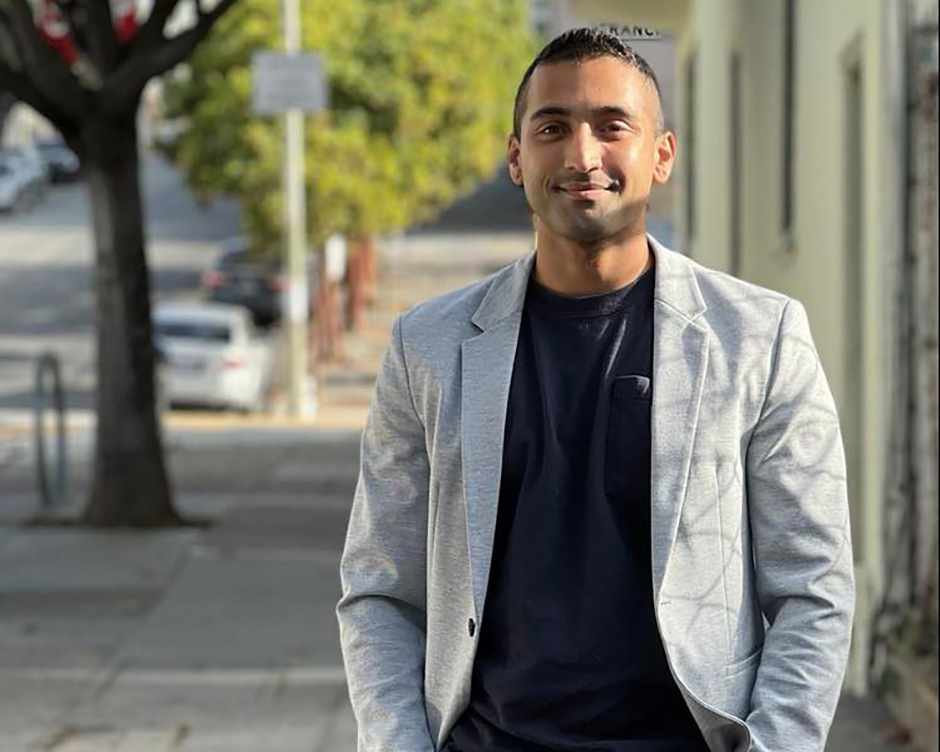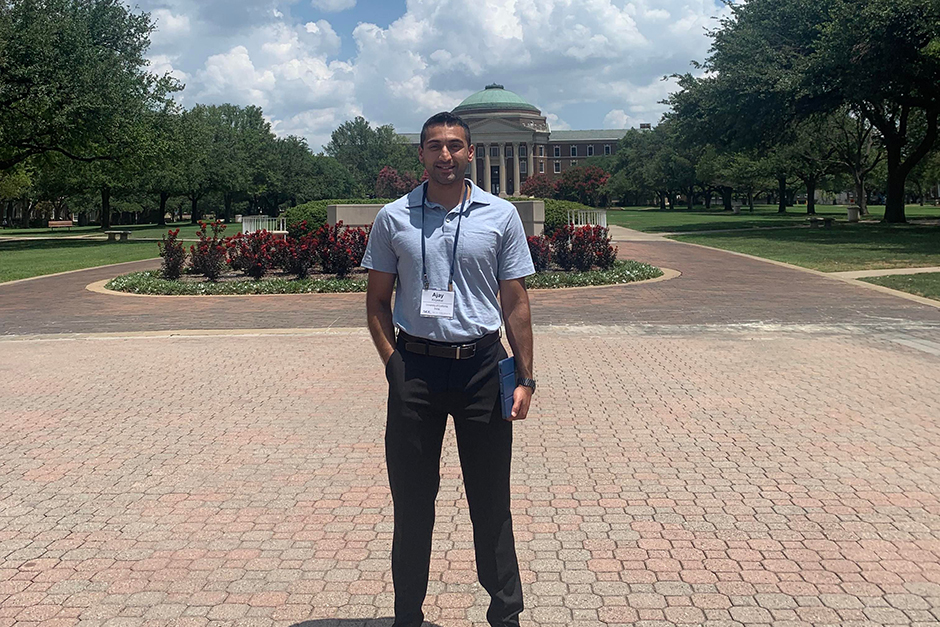Paving his own path
Ajay Kirpekar, finance and macroeconomics Ph.D. ’23, reflects on his academic journey
and why the study of finance is not about money

Ajay Kirpekar’s mother always said that she wanted another doctor in the house. Now that Kirpekar will graduate with a Ph.D. in finance and macroeconomics this spring, his mother, who is a pediatric nephrologist, jokes that he might not be a medical doctor, but at least she got her wish.
Kirpekar’s own journey from a video game-obsessed kid to a Ph.D. candidate discussing macroeconomics and finance with the top experts in his field, surprises even him. Last month, before deciding to accept a position as a quantitative analyst at brokerage firm Edward Jones, Kirpekar found himself discussing policies at the Federal Reserve when he visited Washington D.C. for an interview. He had one of those moments where he felt like he wanted to pinch himself.
“Not many people have the opportunity to do this unique work. In some ways it feels like a dream,” he says.
From the heart
Kirpekar grew up in San Jose in Silicon Valley as the son of immigrant parents from India. His mother is a doctor, his father an engineer-turned-entrepreneur. His family’s dinner table was filled with lively discussions—many of which centered around economics and politics. But despite this intellectual upbringing, by his own account, his journey to a Ph.D. was far from a given.
“I always felt average or below average. I lagged behind my peers,” he says about his early education.
Kirpekar began his undergraduate career at UC Riverside and transferred to UCLA his junior year. After graduating with a B.A. in economics and a minor in mathematics, he worked at the aerospace and defense technology company Northrop Grumman Corporation as a data scientist. He enjoyed being pushed by the work but felt something pulling him back to academia.
The decision to attend UCI to pursue his Ph.D. proved to be an easy one. Kirpekar had friends who lived in the area, he knew it was a good place to set up professionally, and he relished the idea of working with the faculty.
“UCI is a rare gem regarding the talent they’ve attracted. The faculty in macroeconomics and finance are extremely strong,” he says, adding that life as a Ph.D. student proved to be a humbling experience.
“After graduating from UCLA and having a full-time job, I felt I had arrived. I thought I knew all the math and that I was going to be terrific! I was like 22,” he says laughing at himself.
Those first years, with its battery of exams and steep learning curve, were a challenge.
I think about economics and finance all the time. It doesn’t feel like work to me. Plus, there’s a sense of fulfillment and honor of being a student of these faculty who are internationally known in their field.
“I felt like I had imposter syndrome. I questioned if I was cut out for this. My first two years were full of constant insecurities,” he says.
Kirpekar persevered and used the experience as an opportunity for growth, both intellectually and emotionally. It also helped, he says, that the faculty in his department were extremely supportive.
“The irony about finance is that it’s not about the money. The faculty could make so much more money if they didn’t work in academia, but they’re so passionate about what they do. They’re so invested in their students. Their work comes from the heart.”
Kirpekar was already passionate about economics before attending graduate school, but his interactions with faculty pushed his interest to a new level.
“I think about economics and finance all the time. It doesn’t feel like work to me. Plus, there’s a sense of fulfillment and honor of being a student of these faculty who are internationally known in their field,” he says.
One of the most important lessons Kirkepar learned while completing his Ph.D. may not have been quantitative or academic, but emotional.
“I learned to be kind to myself. You can’t be good at what you do if you’re not sleeping well, not healthy physically or mentally, not seeing sunlight. I had to learn how to get out of my own head,” he says.
His positive perspective did not go unnoticed by his dissertation advisor and economics chair William Branch.
“I think among Ph.D. students, it is Ajay's cohort that may have had the most to overcome in balancing remote work and writing a dissertation,” says Branch. “What impresses me most about Ajay is his resilience. He's faced challenges and setbacks along the way, but he always bounces back with a positive attitude and a determination to succeed.”
I like the idea of putting theories into practice. Plus, I want to be in a place financially where I can give back. India has given a lot to my parents, and I’d like to be able to support education in India.
Larger than yourself
After Kirpekar graduates this spring, he plans to straddle both the corporate and academic worlds. He will study to become a Charter Financial Analyst (CFA) charter-holder for his position at Edward Jones while publishing academic papers on the side. He’ll be presenting at the Canadian Economics Association conference this June in Winnipeg and is currently working on submitting other papers with his co-author.
“I like the idea of putting theories into practice,” he says about his decision to go into corporate America. “Plus, I want to be in a place financially where I can give back. India has given a lot to my parents, and I’d like to be able to support education in India,” he says.
If there’s any worry about his ability to wear multiple hats and excel in two worlds, one need only look to his success in graduate school, says Branch, pointing to Kirpekar’s willingness to learn a host of other skills in math and computing in order for him to build models to provide monetary policy advice.
“Ajay is very independent and motivated,” Branch explains. “He would often remark that he came to graduate school in economics because he didn't want to be a programmer like all of his friends. Instead, he became economist, mathematician, statistician, and computer scientist.”
- Jill Kato for UCI Social Sciences



